When you think about enhancing your health, have you considered the role of olive oil in your diet? This staple of Mediterranean cuisine is more than just a cooking ingredient; it's packed with numerous health benefits that can support everything from heart health to cognitive function. With its rich nutritional profile and potential to lower risks of chronic diseases, olive oil could be a simple addition that makes a significant difference in your overall wellness. But what exactly are these benefits, and how can you incorporate them into your daily routine?
Nutritional Composition of Olive Oil
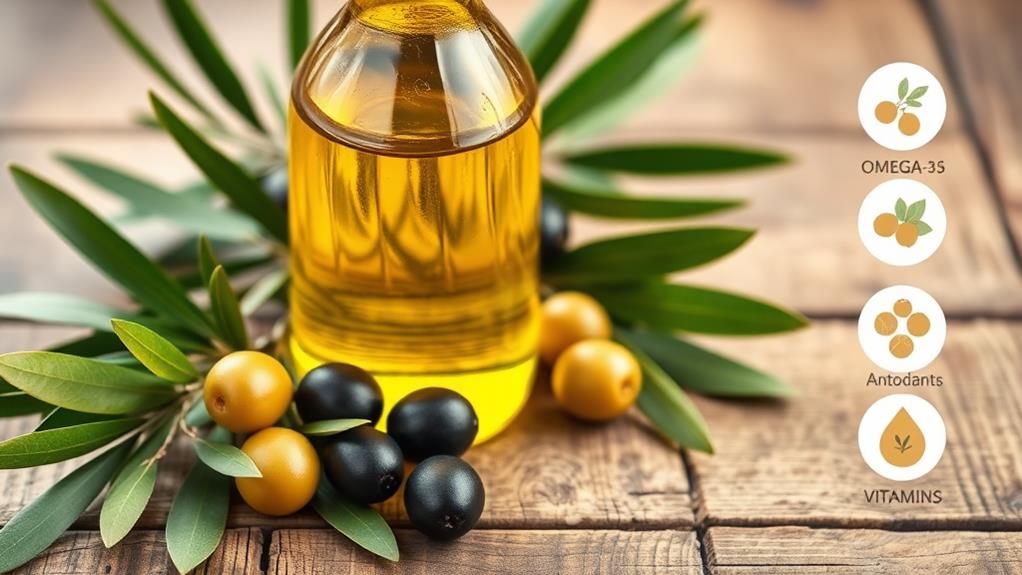
When you explore the nutritional composition of olive oil, you'll find it's primarily made up of about 71% oleic acid, a heart-healthy monounsaturated fat. This means it's a great choice if you want to keep your heart happy!
Alongside oleic acid, olive oil contains 13.8% saturated fat and 10.5% polyunsaturated fat. Compared to other cooking oils, that makes olive oil a healthier option for your meals.
Now, if you're picking olive oil, go for extra virgin olive oil (EVOO). It's the least processed form, which means it keeps the highest levels of nutrients and bioactive compounds.
Plus, it provides some impressive vitamins. A serving of olive oil gives you about 13% of your daily value for vitamin E and 7% for vitamin K.
Antioxidant Properties
Olive oil, especially extra virgin olive oil (EVOO), is packed with powerful antioxidants that play an essential role in protecting your cells from oxidative damage.
These antioxidants, like the ones found in EVOO, help combat oxidative stress, which is when there are too many free radicals in your body. You don't want those pesky free radicals causing trouble!
EVOO contains over 20 types of polyphenols, which are known for their health-boosting benefits. One standout is oleocanthal, which not only tastes great but also helps lower inflammation.
Regularly using EVOO in your diet can even lower your cancer risk by 31%! That's right—those little antioxidants are hard at work keeping you safe.
Plus, the antioxidants in olive oil, like oleuropein, help protect your heart by stopping bad LDL cholesterol from oxidizing.
This is super important because oxidized cholesterol can lead to atherosclerosis, which isn't something you want.
Anti-Inflammatory Effects
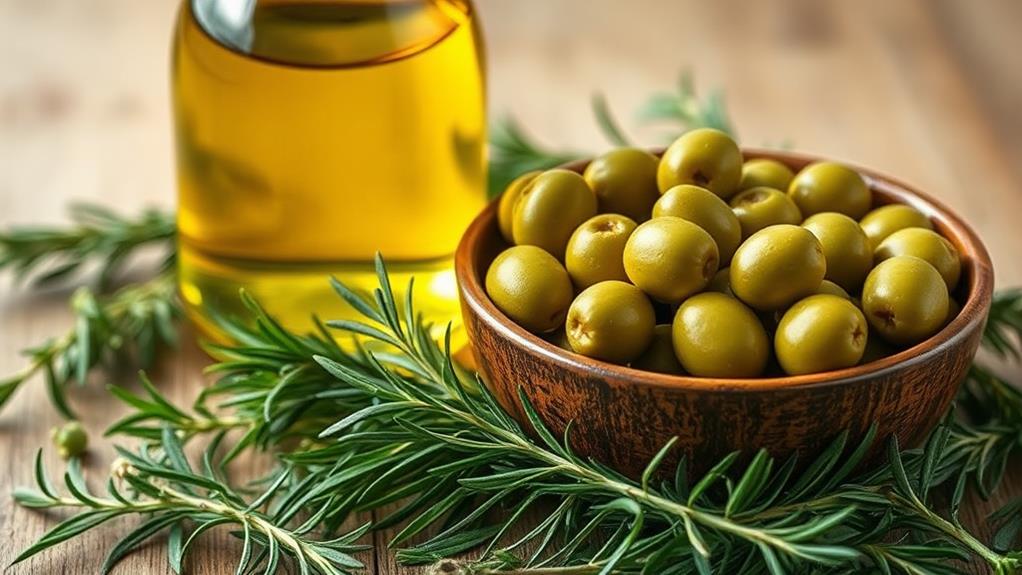
Inflammation can be a silent culprit behind many chronic diseases, but incorporating extra virgin olive oil (EVOO) into your diet can help combat it. You mightn't know, but EVOO contains oleocanthal, a compound that works like ibuprofen to reduce inflammation. That's pretty impressive for a cooking oil!
Regularly using EVOO has been linked to lower levels of inflammatory markers, such as C-reactive protein (CRP), which can help keep chronic diseases at bay.
One of the coolest things about extra-virgin olive oil is its high polyphenol content. These tiny superheroes of the oil world—over 20 different types—offer protection against oxidative damage in your cells.
Studies show that adding olive oil to your diet can considerably lower inflammation markers, especially for folks with conditions like rheumatoid arthritis.
Plus, these anti-inflammatory effects are a big reason why the Mediterranean diet is so popular. It's not just delicious; it's linked to lower risks of chronic diseases, including heart disease.
Heart Health Benefits
Boosting your heart health can be as simple as incorporating extra virgin olive oil (EVOO) into your daily meals. This tasty oil is packed with monounsaturated fatty acids, which can help lower your LDL (bad) cholesterol while raising your HDL (good) cholesterol. That's a win for your heart!
Studies show that regular olive oil consumption is linked to a reduced risk of cardiovascular disease, meaning fewer chances of heart problems down the road. Plus, if you're enjoying the Mediterranean diet, which features olive oil prominently, you're likely to see even more heart health benefits. This diet has been associated with lower blood pressure and better overall cardiovascular function.
Olive oil also contains antioxidants and anti-inflammatory compounds that protect against oxidative stress and inflammation—two sneaky culprits in heart disease.
And here's a fun fact: people who use olive oil often need fewer medications for high blood pressure. So, next time you drizzle olive oil on your salad or veggies, remember, you're not just adding flavor; you're giving your heart a little love too!
Stroke Risk Reduction
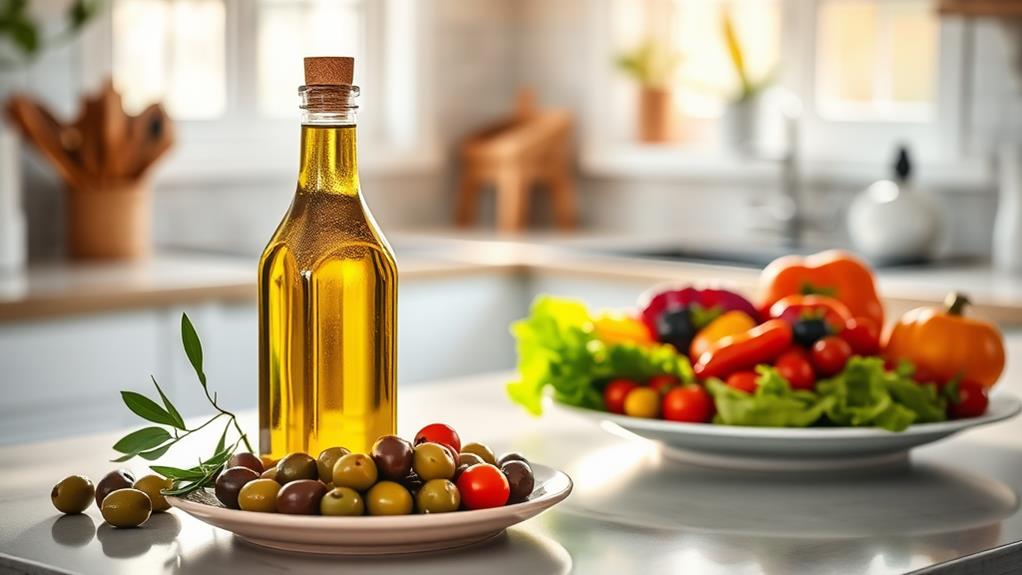
Incorporating extra virgin olive oil into your diet can also play a role in reducing stroke risk. While research has shown mixed results, many experts believe that olive oil's high content of monounsaturated fats and antioxidants contributes to overall cardiovascular health.
This is great news, since good heart health is super important for keeping strokes at bay!
When you enjoy olive oil, especially as part of the Mediterranean diet, you're not just adding flavor to your meals; you're also helping lower your chances of cardiovascular diseases, which are closely linked to stroke risk.
Picture it: a tasty salad drizzled with olive oil not only makes your taste buds happy but may also be a friend to your heart.
However, it's wise to consult healthcare professionals for personalized advice. They can help you find the right balance in your diet, especially if you're focusing on stroke risk reduction.
Weight Management
If you're looking to manage your weight effectively, adding olive oil to your meals could be a smart choice. Studies show that following a Mediterranean diet, rich in olive oil, can help with weight loss compared to diets low in it.
Why? Well, olive oil enhances satiety, meaning you feel fuller for longer. This can help you cut back on overall calorie intake, making it easier to stick to your weight management goals.
Regularly using olive oil isn't just about feeling full; it also supports your metabolic health. This means it can help your body burn fat more efficiently, which is great for achieving a healthier body composition.
A 2023 review even found that adding olive oil to a reduced-calorie diet can improve your lipid profiles and help with body fat distribution.
But remember, moderation is key! Aim for about 27 grams, or just under 2 tablespoons, each day to get the best benefits without overdoing it.
Cognitive Health Support
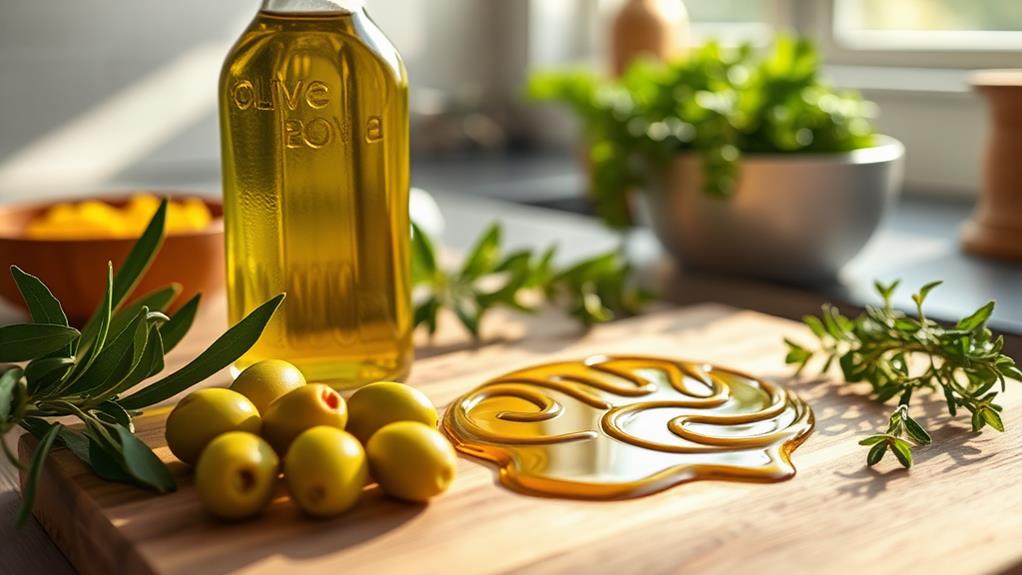
Harnessing the power of olive oil can greatly benefit your cognitive health. You might be surprised to learn that regular use of olive oil, especially extra virgin, can help protect your brain! Studies indicate that it could lower the risk of Alzheimer's disease by reducing neuroinflammation and oxidative stress in your brain. That means it fights off those pesky brain troubles we don't want as we age.
The antioxidants in olive oil, particularly polyphenols, are superheroes for your brain. They work hard to enhance brain health and battle neurodegenerative diseases.
Plus, it's been found that the Mediterranean diet, loaded with olive oil, links to lower rates of cognitive impairment in older adults. So, if you want to keep your mind sharp, olive oil is your friend!
With its anti-inflammatory properties, olive oil may help reduce markers that contribute to cognitive disorders.
Type 2 Diabetes Prevention
Olive oil's remarkable properties can play a crucial role in preventing type 2 diabetes. You might be surprised to learn that a 2019 study showed prediabetics who consumed olive oil had a 55% lower risk of developing diabetes compared to those who didn't. That's pretty impressive, right?
Regularly adding olive oil to your meals can help improve glycemic control, which means better blood sugar management.
When you eat a diet rich in olive oil, like the Mediterranean diet, you're enhancing your insulin sensitivity and glucose metabolism. These two factors are essential for keeping type 2 diabetes at bay.
Plus, olive oil supports your metabolic health without packing on extra pounds, making it a smart choice for diabetes prevention.
Anticancer Effects

High olive oil consumption isn't just beneficial for managing blood sugar; it may also lower your cancer risk. Research shows that a diet rich in olive oil can lead to a 31% reduction in cancer risk. That's impressive! The Mediterranean diet, which is full of tasty olive oil, is linked to lower rates of colorectal and breast cancers. Who knew a drizzle of olive oil could do so much?
One of the secrets behind olive oil's power lies in its antioxidants, especially polyphenols. These little warriors help fight off free radicals, which can damage cells and lead to cancer.
Plus, olive oil has some fantastic anti-inflammatory properties. By reducing chronic inflammation, it may keep those pesky tumors from growing.
And here's another fun fact: people who use olive oil in their meals often have lower risks of developing type 2 diabetes, which is also connected to higher cancer risks.
Rheumatoid Arthritis Relief
Recent research suggests that adding olive oil to your diet could offer relief for those dealing with rheumatoid arthritis.
It's not just a tasty addition to your meals; it might help reduce those pesky inflammatory markers that make your joints ache. One of the special compounds in olive oil, called oleocanthal, has anti-inflammatory properties that can ease joint pain and stiffness. Imagine waking up and feeling a little less creaky!
If you regularly include olive oil as part of a balanced diet, you might improve your overall joint health. This is especially true if you follow the Mediterranean diet, which is rich in olive oil and linked to fewer symptoms of rheumatoid arthritis.
Who knew that delicious food could also be good for you?
While there isn't tons of research yet, incorporating olive oil into your meals can be a great complementary approach alongside traditional treatments.
Cooking Versatility
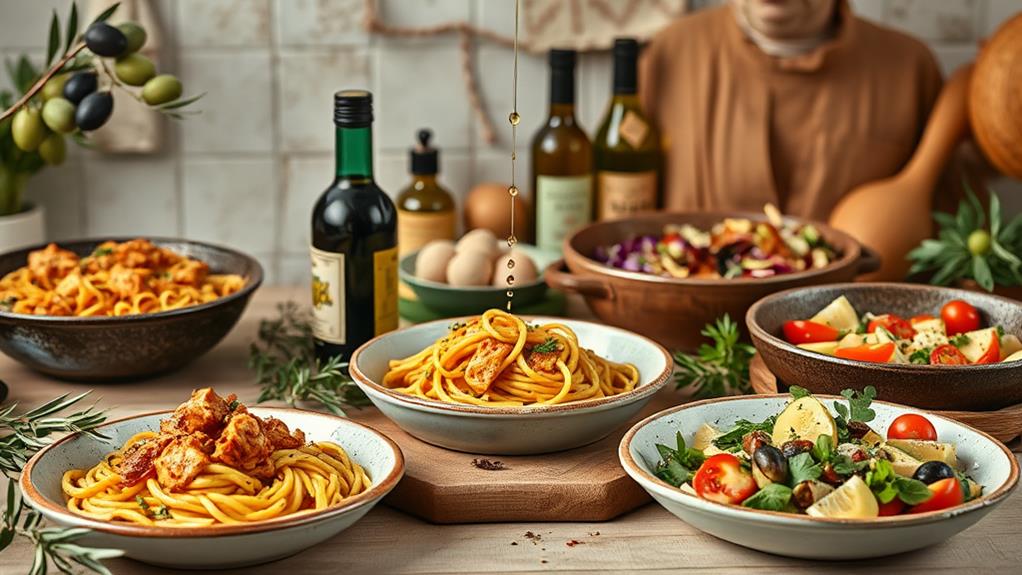
When it comes to cooking, extra virgin olive oil (EVOO) stands out for its remarkable versatility. You can use it in so many ways! Thanks to its high smoke point, it's perfect for sautéing, roasting, or grilling without losing those healthy benefits.
Plus, it adds a rich flavor to your dishes, making everything taste just a little bit better. Drizzle olive oil over salads or cooked veggies, and watch your meals come alive!
If you're trying to eat healthier, olive oil can easily replace less healthy fats like butter or margarine in your recipes. It's a great way to boost your healthy dietary fat intake while still enjoying tasty food.
But don't stop there! You can even use olive oil for baking, although its unique flavor mightn't work for every dessert.
Want to kick your sauces, marinades, and dressings up a notch? Olive oil is your secret weapon! It not only adds a savory punch but also helps pack in nutrients.
With all these uses, it's clear that olive oil is one of the most versatile cooking oils you can have in your kitchen. So, why not give it a try?
Olive Oil Grades
Choosing the right olive oil can greatly impact both the taste of your dishes and your health.
When it comes to olive oil, you've got three main grades to choose from: Extra Virgin Olive Oil (EVOO), Virgin Olive Oil (VOO), and refined olive oil.
EVOO is your top pick! It's the least processed, meaning it keeps the highest levels of nutrients and antioxidants. To be classified as extra virgin, it must have a free acidity level of less than 0.8%. This guarantees you're getting superior quality and flavor.
Virgin Olive Oil is a step down. It's a bit more processed than EVOO, but still holds onto many beneficial compounds.
Now, refined olive oil? Well, it's undergone significant processing, which means it's lost a lot of those healthy antioxidants we love.
Recommended Daily Intake

Incorporating olive oil into your daily diet can be a flavorful way to boost your health, but knowing the right amount to use is key. The 2020-2025 Dietary Guidelines suggest a daily intake of about 27 grams of added oils for a 2,000 calorie diet. That's just under 2 tablespoons, and olive oil is a great choice! To really enjoy the health benefits, you should aim for at least 1/2 tablespoon each day.
Now, you might be thinking, "That sounds easy!" But remember, olive oil is calorie-dense, with around 120 calories per tablespoon. So, moderation is essential. Your recommended intake might change based on your age, sex, and how active you are. If you're unsure, chatting with a dietitian can give you personalized advice on oil consumption.
The good news? Olive oil can enhance the flavor of your meals without adding too many extra calories when balanced with other dietary fats. So, drizzle it over salads or toss it with veggies. It's a tasty way to enjoy the health benefits while keeping your daily intake in check!
Ways to Incorporate Olive Oil
Olive oil isn't just a healthy addition to your diet; it's also incredibly versatile in the kitchen. One of the easiest ways to incorporate extra virgin olive oil (EVOO) is by using it as a salad dressing. Just whisk it with balsamic vinegar and a bit of mustard for a tasty, healthy boost.
Drizzle some olive oil over roasted vegetables before baking to enhance their flavor and make the most of EVOO's antioxidant properties.
You can also use olive oil for sautéing or as a finishing touch on your dishes. This way, you keep its delicious taste intact while enjoying its health benefits.
If you love baking, try substituting olive oil for butter or margarine. It'll improve the nutritional quality of your treats without losing any flavor—who says you can't have your cake and eat it too?
Aim for at least 1/2 tablespoon of olive oil daily. Regular consumption is linked to amazing health benefits, including heart health and the ability to reduce inflammation.
Skin Health Benefits

When it comes to nurturing your skin, few natural ingredients can rival the benefits of olive oil. This golden liquid is packed with antioxidants, like vitamin E, which not only boosts skin elasticity but also protects against oxidative stress and UV damage.
So, if you want your skin to feel young and bouncy, olive oil is your friend!
If you've got dry skin, olive oil can be a real game-changer. Its moisturizing properties provide hydration that helps improve your skin's overall texture.
Plus, regular use might even give you some anti-aging effects, thanks to its rich blend of polyphenols and fatty acids that work hard to nourish your skin.
But that's not all! If you struggle with inflammation or conditions like eczema or psoriasis, olive oil can offer soothing benefits.
It can help reduce redness and calm irritated skin, making you feel more comfortable in your own skin.
So, whether you're cooking with it or applying it directly, olive oil is a simple, natural way to keep your skin happy and healthy.
Who knew that something so delicious could also be so good for you?
Bone Health Improvement
One significant benefit of olive oil is its potential to improve bone health. You might be surprised to learn that olive oil contains oleic acid, which helps your body absorb calcium better. This means your bones can get stronger!
The polyphenols found in extra virgin olive oil, like oleuropein, are superheroes for your bones. They can reduce bone loss and boost the activity of osteoblasts, the cells that help build new bone.
If you follow a Mediterranean diet rich in olive oil, you're not just enjoying delicious flavors. Research shows this diet is linked to a lower risk of osteoporosis and fractures, especially in older adults.
The anti-inflammatory properties of olive oil work wonders for maintaining bone health. Plus, studies suggest that combining olive oil with regular physical activity can give your bones an even greater boost.
Digestive Health Support
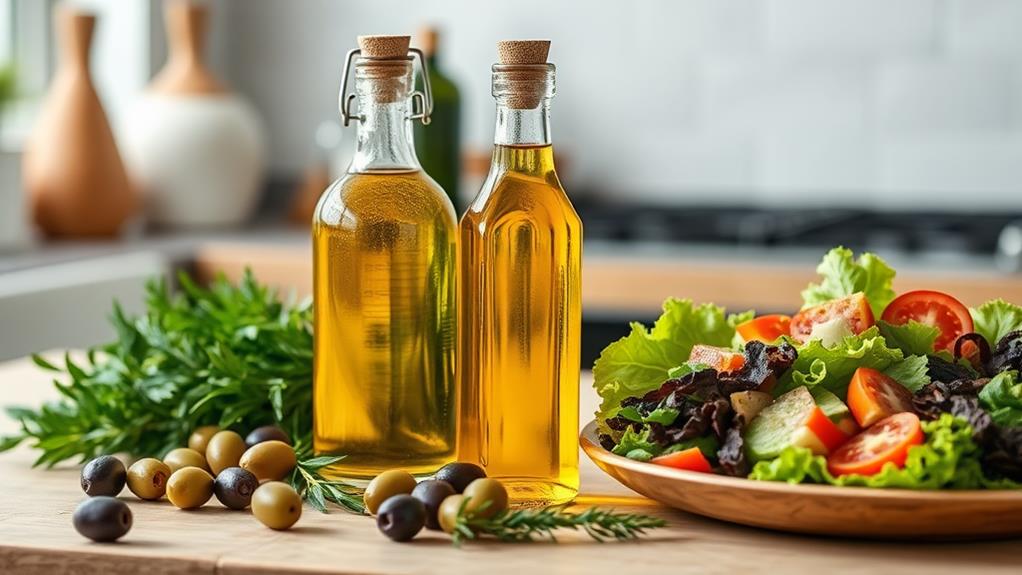
Good digestion is essential for overall health, and incorporating olive oil into your diet can greatly support this important function. Olive oil is packed with monounsaturated fats, which are like little superheroes for your gut. They help reduce symptoms of inflammatory bowel diseases, such as ulcerative colitis and Crohn's disease, by calming inflammation. How cool is that?
Extra virgin olive oil is even better since it contains phenolic compounds. These compounds can protect your gut lining, which may lower the risk of gastrointestinal disorders.
Plus, if you're struggling with constipation, olive oil can work wonders. Its healthy fats help promote smoother bowel movements, making your digestive health feel a lot better.
And here's a bonus: regular consumption of olive oil can help you absorb fat-soluble vitamins like A, D, E, and K. So, not only are you helping your tummy, but you're also getting your vitamins!
Immune System Boost
Boost your immune system by adding olive oil to your diet! This golden liquid isn't just tasty; it's packed with antioxidants and anti-inflammatory compounds. One superstar in olive oil is oleocanthal, which helps fight oxidative stress and strengthens your immune system.
You mightn't know it, but about 70% of your immune system lives in your gut, and olive oil supports gut health too! When you drizzle extra virgin olive oil on your meals, you're not just making them delicious; you're also boosting your body's immune response.
The polyphenols in olive oil work to reduce inflammation and get your immune cells moving. Studies even suggest that regularly enjoying olive oil can lower your chances of autoimmune diseases by tackling chronic inflammation and oxidative damage.
Plus, a recent meta-analysis from 2022 showed that higher olive oil consumption is linked to fewer infections. So, the next time you're in the kitchen, remember that olive oil isn't just a cooking staple; it's a superhero for your immune system!
With its tasty benefits, you'll want to pour it on everything—your health will thank you!
Mood Enhancement
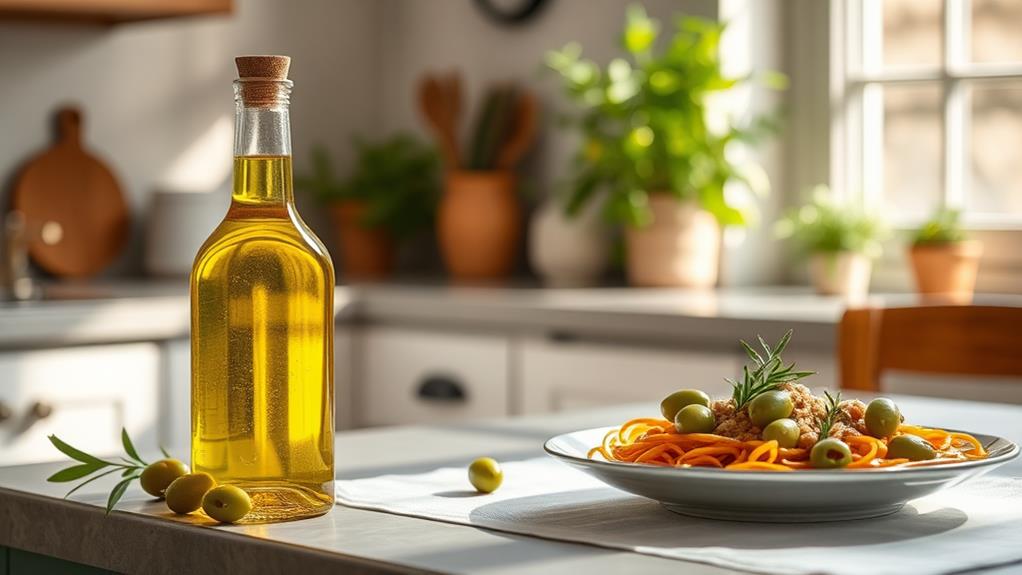
When you include extra virgin olive oil in your diet, you might be pleasantly surprised by its potential to enhance your mood. Research shows that this delicious oil can help improve symptoms of major depression. That's right! A little drizzle can go a long way in lifting your spirits.
Olive oil also plays a role in your cognitive health. It helps your blood-brain barrier function better, which is super important for keeping your mood stable.
Plus, regular consumption can lower inflammation and oxidative stress, both of which can affect how you feel.
If you enjoy a Mediterranean diet rich in olive oil, you might notice that you feel happier and more balanced. Studies suggest that people who eat this way often report lower rates of depression.
And guess what? Olive oil might even help regulate your gut hormones, which can lead to better mood regulation and feeling full after meals.
Longevity and Aging
As you explore the health benefits of olive oil, you'll discover its remarkable role in promoting longevity and healthy aging. Regularly enjoying olive oil can help you reduce your cancer risk by an impressive 31%, according to a recent study. That's a pretty good reason to drizzle it on your salad!
Plus, the Mediterranean diet, which is rich in olive oil, is known for lowering mortality rates and fighting off chronic diseases.
But there's more! Olive oil is packed with antioxidants, which help protect your cells from damage. This means you could be fighting off those pesky signs of aging while enjoying a tasty meal.
Also, a 2024 review shows that olive oil might lower the risk of Alzheimer's disease by reducing neuroinflammation. This supports cognitive health as you get older, keeping your mind as sharp as your favorite kitchen knife.
Metabolic Syndrome Management

In the quest for better health, olive oil stands out as a powerful ally in managing metabolic syndrome. This tasty oil, especially the extra virgin kind, is packed with monounsaturated fats that can boost your insulin sensitivity. That means it can help keep your blood sugar levels in check, which is super important if you're dealing with metabolic syndrome.
But wait, there's more! Regularly enjoying olive oil can lower your triglycerides and improve your lipid profiles, which is great for your cardiovascular health. A study from 2019 even found that folks with prediabetes who added olive oil to their meals had a 55% lower risk of developing type 2 diabetes mellitus. Talk about a win-win!
Olive oil also has powerful antioxidants that fight inflammation, a sneaky culprit in worsening metabolic syndrome.
Plus, when you incorporate this oil into your meals, it can help you feel full and satisfied, making weight management a bit easier. So, drizzle some olive oil on your salad or veggies! Your body—and taste buds—will thank you for it.
Overall Wellness Benefits
Olive oil isn't just beneficial for managing metabolic syndrome; it also plays a significant role in overall wellness. When you add olive oil to your meals, you're giving your heart a big hug! Extra virgin olive oil is packed with healthy fats that lower bad cholesterol and boost the good stuff. That's great for heart health!
But wait, there's more! The antioxidants in olive oil help fight inflammation and oxidative stress. This means you could lower your risk of chronic diseases like cancer and diabetes.
Plus, it's like a brain booster! Studies suggest that regular olive oil consumption might even lower the risk of Alzheimer's by keeping your brain healthy and happy.
If you're following the Mediterranean diet, which is famous for its olive oil, you're on the right track. This diet is linked to longer life and fewer heart problems.
So, next time you drizzle olive oil on your salad or pasta, remember you're not just making it tasty. You're also taking a step toward better health and wellness. It's a win-win!
